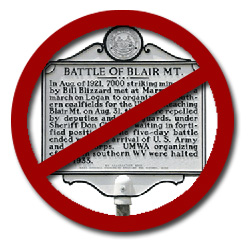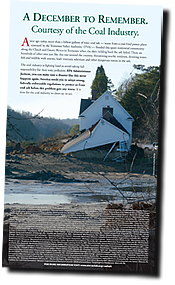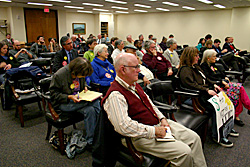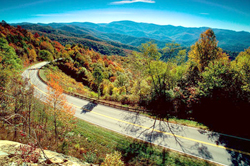 The characters are different but the plot is all too familiar:
The characters are different but the plot is all too familiar:
In the movie Avatar, Parker Selfridge of the RDA mining corporation, has the bulldozers take down the Na’vi history tree. It’s standing between them and a valuable black energy rock called “unobtainium.”
In Appalachia, Randall Reid Smith, WV Commissioner of Culture and History, asks the National Park Service to remove National Historic Register designation from Blair Mountain, site of a major 1921 confrontation between the coal miners unions and the coal industry. On Jan. 8, 2010, Carol Schull, Chief of the National Register for the Park Service, announces an unprecedented de-listing of a national historical site, effective immediately.
Appalachia’s history is standing in the way of another valuable black rock.
“If they can Stalinize our history like this, it shows that big coal still owns our state government,” said Wess Harris, editor of “When Miners March,” a book documenting the union’s side of the battle of Blair Mountain. “This action does not stand alone but is part of a deliberate effort to erase Appalachian history.”
The site of the 1921 armed conflict between over ten thousand coal miners and company guards involved at least 80 deaths. The site has enormous significance for historians and for the American labor movement.
Letters of support for the original historic places listing—approved just last March of 2009—came from the Presidents of the United Mine Workers of America, the Society for Historical Archeology, the Society of American Archeology, and many other historians and scholars.
“The Blair Mountain Battlefield is a unique historic and cultural treasure that deserves all the recognition and protection we can muster,” said archeology professor Harvard Ayers of Appalachian State University. “The coal industry…conducted a scare campaign to con property owners within the nomination boundary into signing formal objections to the listing. “
The decision to de-list Blair Mountain (first reported in a blog post by Jeff Biggers) is questionable on a number of levels, not the least of which is that two of the property owners who supposedly object to the Historical listing are deceased.
In the movie Avatar, the Na’vi of Pandora have intricate language, customs and connections to the natural world that supports them. They are under assault from corporate greed, and one of the first places attacked is their historical memory contained in the Tree of Voices.
Appalachian people have similarly intricate connections to the natural world of Appalachia—connections that they are losing as explosives and giant bulldozers destroy the mountains for coal.
Their history is also under assault.
Its one thing to watch a movie, but it’s another to understand the point that a movie like Avatar is trying to make.
Outside the popcorn palaces, the harsh reality of the struggle over valuable black rock is evident not in distant lands or remote worlds, but very close to home.




 On Tuesday, Duke Energy and the North Carolina Utility Commission reached a preliminary settlement on Duke’s request for a substantial rate increase on residential and commercial utilities.
On Tuesday, Duke Energy and the North Carolina Utility Commission reached a preliminary settlement on Duke’s request for a substantial rate increase on residential and commercial utilities..jpg) During yesterday’s hearing, over a dozen residents spoke out against the rate hike, citing health concerns, economy, and the lack of need for the
During yesterday’s hearing, over a dozen residents spoke out against the rate hike, citing health concerns, economy, and the lack of need for the  A representative of the North Carolina Conservation Network delivered a petition signed by over 1500 citizens asking that the rate hike request be rejected, and an attorney with the North Carolina Justice Center, testified on behalf of the disadvantaged residents of the state, noting that of the 1.3 million poor people currently living in North Carolina, none of them could afford to pay for the increase, either monetarily or physically.
A representative of the North Carolina Conservation Network delivered a petition signed by over 1500 citizens asking that the rate hike request be rejected, and an attorney with the North Carolina Justice Center, testified on behalf of the disadvantaged residents of the state, noting that of the 1.3 million poor people currently living in North Carolina, none of them could afford to pay for the increase, either monetarily or physically. After a 14-day initial review period, the Environmental Protection Agency’s regional offices followed the lead of EPA headquarters, recommending that all 79 pending mountaintop removal mining valley fill permits be remanded into a full 60-day extended review process. The extended review will closely examine potential environmental and health impacts of the valley fills on headwater streams and watersheds, and is part of the EPA’s promise of a more stringent review process for overseeing mountaintop removal coal mining. During the previous presidential administration, a change to the “fill rule” in the Clean Water Act allowed permits for mountaintop removal valley fills to be rubberstamped without conducting any environmental or health impact assessments.
After a 14-day initial review period, the Environmental Protection Agency’s regional offices followed the lead of EPA headquarters, recommending that all 79 pending mountaintop removal mining valley fill permits be remanded into a full 60-day extended review process. The extended review will closely examine potential environmental and health impacts of the valley fills on headwater streams and watersheds, and is part of the EPA’s promise of a more stringent review process for overseeing mountaintop removal coal mining. During the previous presidential administration, a change to the “fill rule” in the Clean Water Act allowed permits for mountaintop removal valley fills to be rubberstamped without conducting any environmental or health impact assessments. Shortly after a
Shortly after a  The latest documentary film to examine mountaintop removal coal mining in Appalachia, “Coal Country,” premiered Saturday, July 11 night to a standing-room-only crowd. While the event was mostly uneventful, during the screening there were boos and heckling from pro-mountaintop removal people in the audience and Capitol Police escorted several coal miners from the building after the screening.
The latest documentary film to examine mountaintop removal coal mining in Appalachia, “Coal Country,” premiered Saturday, July 11 night to a standing-room-only crowd. While the event was mostly uneventful, during the screening there were boos and heckling from pro-mountaintop removal people in the audience and Capitol Police escorted several coal miners from the building after the screening.